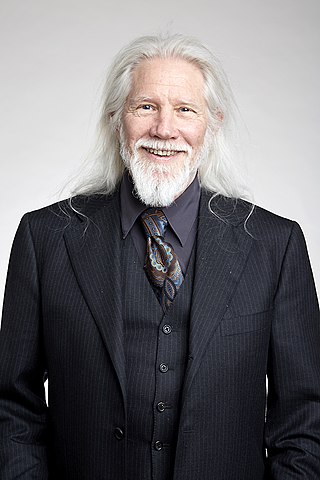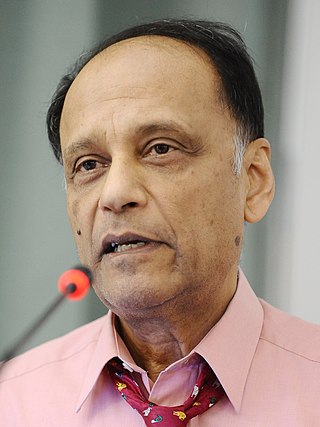
Madhu Sudan is an Indian-American computer scientist. He has been a Gordon McKay Professor of Computer Science at the Harvard John A. Paulson School of Engineering and Applied Sciences since 2015.

Bailey Whitfield 'Whit' Diffie ForMemRS is an American cryptographer and mathematician and one of the pioneers of public-key cryptography along with Martin Hellman and Ralph Merkle. Diffie and Hellman's 1976 paper New Directions in Cryptography introduced a radically new method of distributing cryptographic keys, that helped solve key distribution—a fundamental problem in cryptography. Their technique became known as Diffie–Hellman key exchange. The article stimulated the almost immediate public development of a new class of encryption algorithms, the asymmetric key algorithms.
In artificial intelligence, artificial immune systems (AIS) are a class of computationally intelligent, rule-based machine learning systems inspired by the principles and processes of the vertebrate immune system. The algorithms are typically modeled after the immune system's characteristics of learning and memory for use in problem-solving.

Sir Partha Sarathi Dasgupta is an Indian-British economist who is Frank Ramsey Professor Emeritus of Economics at the University of Cambridge, United Kingdom, and a fellow of St John's College, Cambridge.
Thomas Kailath is an Indian born American electrical engineer, information theorist, control engineer, entrepreneur and the Hitachi America Professor of Engineering emeritus at Stanford University. Professor Kailath has authored several books, including the well-known book Linear Systems, which ranks as one of the most referenced books in the field of linear systems.

Christos Charilaos Papadimitriou is a Greek theoretical computer scientist and the Donovan Family Professor of Computer Science at Columbia University.
Fred Barry Schneider is an American computer scientist, based at Cornell University, where he is the Samuel B. Eckert Professor of Computer Science. He has published in numerous areas including science policy, cybersecurity, and distributed systems. His research is in the area of concurrent and distributed systems for high-integrity and mission-critical applications.
Lydia E. Kavraki is a Greek-American computer scientist, the Noah Harding Professor of Computer Science, a professor of bioengineering, electrical and computer engineering, and mechanical engineering at Rice University. She is also the director of the Ken Kennedy Institute at Rice University. She is known for her work on robotics/AI and bioinformatics/computational biology and in particular for the probabilistic roadmap method for robot motion planning and biomolecular configuration analysis.

Purnendu K. Dasgupta is a professor of chemistry and biochemistry at the University of Texas at Arlington.
Alexander Vardy was a Russian-born and Israeli-educated electrical engineer known for his expertise in coding theory. He held the Jack Keil Wolf Endowed Chair in Electrical Engineering at the University of California, San Diego. The Parvaresh–Vardy codes are named after him.
Chandrashekhar Dasgupta was an Indian civil servant, diplomat and writer who served as Indian ambassador to the European Union, Belgium, Luxembourg and China.
Ranjan Kumar Mallik is an Indian electrical and communications engineer and a professor at the Department of Electrical Engineering of the Indian Institute of Technology, Delhi. He held the Jai Gupta Chair at IIT Delhi from 2007 to 2012 and the Brigadier Bhopinder Singh Chair from 2012 to 2017. He is known for his researches on multiple-input multi-output systems and is an elected fellow of all the three major Indian science academies viz. Indian Academy of Sciences, Indian National Science Academy, and The National Academy of Sciences, India. He is also an elected fellow of The World Academy of Sciences, Indian National Academy of Engineering, and The Institute of Electrical and Electronics Engineers, Inc.
Yendluri Shanthi Pavan is an Indian electrical engineer and a professor at the Department of Electrical Engineering of the Indian Institute of Technology, Madras. He is known for his studies on mixed signal VLSI circuits and is an elected fellow of the Indian National Academy of Engineering. He is also a fellow of IEEE. The Council of Scientific and Industrial Research, the apex agency of the Government of India for scientific research, awarded him the Shanti Swarup Bhatnagar Prize for Science and Technology, one of the highest Indian science awards for his contributions to Engineering Sciences in 2012.
Joseph C. Decuir is an American fellow of the Institute of Electrical and Electronics Engineers (IEEE) who was nominated in 2015 for contributions to computer graphics and video games.
Qiang Ji from the Rensselaer Polytechnic Institute, Troy, New York, United States, was named Fellow of the Institute of Electrical and Electronics Engineers (IEEE) in 2015 for contributions to automatic facial image processing and affective computing.
Christian Laurent is an electrical engineer with the National Center for Scientific Research in Toulouse, France. Laurent was named a Fellow of the Institute of Electrical and Electronics Engineers (IEEE) in 2015 for his research into electrical aging and charge transport in insulating polymers.
Debendra Mallik is an electrical engineer at Intel Corporation in Chandler, Arizona. He was named a Fellow of the Institute of Electrical and Electronics Engineers (IEEE) in 2015 for his contributions to microprocessor packaging.
David Pommerenke is an electrical engineer from the Graz University of Technology. He was named a Fellow of the Institute of Electrical and Electronics Engineers (IEEE) in 2015 for his work with system-level electrostatic discharge technology.
Johan Suykens is a full professor from KU Leuven in Belgium. He was named a Fellow of the Institute of Electrical and Electronics Engineers (IEEE) in 2015 for developing least squares support vector machines.
Kun Zhou, an engineer from the Zhejiang University, Hangzhou, China, was named Fellow of the Institute of Electrical and Electronics Engineers (IEEE) in 2015 for contributions to shape modeling and GPU computing.




